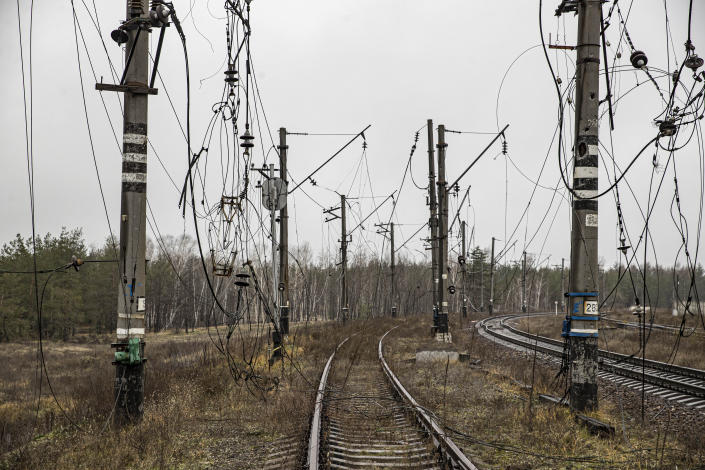TBILISI, Georgia — It’s been nine months since Russia launched its “special operation” in Ukraine in what President Vladimir Putin claimed was done to “de-Nazify” the region. Since February, millions of Ukrainians have fled to neighboring countries, while others, unable to leave, have taken shelter in train stations and in the basements of buildings from heavy shelling and invading forces.
As the weather in Ukraine drops below freezing, with average temperatures this time of year around 20°F, civilians will be forced to defend themselves against another threat: the oncoming winter. In recent weeks, Russia’s military has ramped up attacks on critical infrastructures in cities such as Kyiv and Lviv. In just one day last month, Russia’s military launched between 60 and 100 missiles at several major cities.
Among the targets was the national power grid, its operator said. Volodymyr Kudrytskyi, CEO of Ukrenergo, said the attacks on the grid had been “colossal.” In a briefing to reporters, he stated that Ukrainians could face power outages as the grid could not “generate as much energy as consumers can use.”
As a result of the colder weather and lack of basic necessities in Ukraine, a World Health Organization regional director said that at least 3 million people would be displaced in the coming months. “This winter will be life-threatening for millions of people in Ukraine,” Hans Henri P. Kluge said in a statement. “We expect 2–3 million more people to leave their homes in search of warmth and safety.”
Similarly, the top U.S. general and chairman of the Joint Chiefs of Staff, Mark Milley, said there would be “incalculable human suffering” as families are left without electricity and heat. “Basic human survival and subsistence is going to be severely impacted, and human suffering for the Ukrainian population is going to increase,” Milley said. He went on to say that the Russian strikes on energy infrastructure would “undoubtedly hinder Ukraine’s ability to care for the sick and the elderly. … The elderly are going to be exposed to the elements.”
On Tuesday, during a NATO two-day conference held in Romania, Secretary-General Jens Stoltenberg accused Putin of trying to “weaponize winter.” “Russia is using brutal missile and drone attacks to leave Ukraine cold and dark this winter,” Stoltenberg said. Now Ukrainians are either forced to “freeze or flee.”
And there are some who are deciding to stay. Yahoo News spoke to a mother of two based in Lviv, where she runs a bakery with her husband. Asked why she wanted to stay despite the bombings and the looming bitter winter, Kateryna Humenyuk said: “Of course, we are worried. But as long as it is possible to live here, we will raise the economy of our country and look for all possible options for the safety of our children.”
In the residential area where she lives, Humenyuk said that the infrastructure had been “badly damaged” from a previous bombing. “There was no light and therefore no heat.” She added: “But fortunately, our energy workers have restored everything and there is still light, although there are still intermittent blackouts.” For those, Humenyuk explained how her husband connected an ordinary lightbulb to a car battery. ”It’s a pity it does not give warmth,” she said.
Across Ukraine, there are organizations, both local and international, that are helping those who will stay during the long winter. One organization on the ground in Ukraine is Plan International, which, among other services, provides Ukrainians with thermal blankets, winter clothing, heat appliances and fuel ahead of the winter months.
Speaking to Yahoo News, Mia Haglund Heelas, Plan International’s head of Mission Ukraine Crisis Response, said that the freezing temperatures will have a “brutal impact” on the lives of millions of Ukrainian children and their families. “Many are living in homes that are damaged and are not able to provide the protection that you need when you meet very harsh winter conditions,” she said. “Now, with the beginning of winter, and the below-zero temperatures, this is the start of an extremely difficult few months ahead.”
With the charity being a children’s rights organization, Heelas said it also provides protective gear for children making their way to school during the harsh winter conditions. So far the organization has supported around 14,000 individuals, particularly those living in isolated areas.




